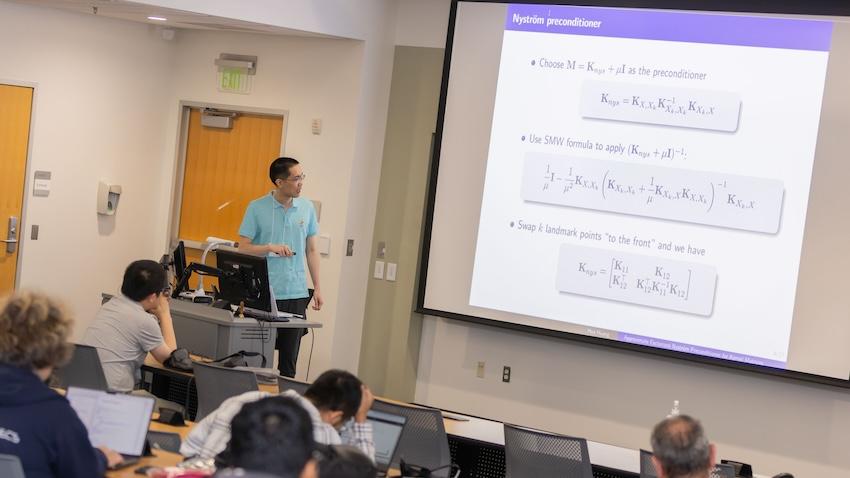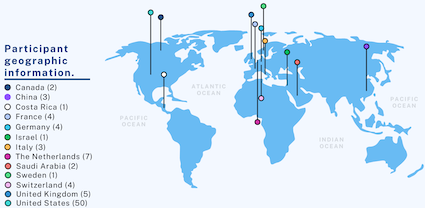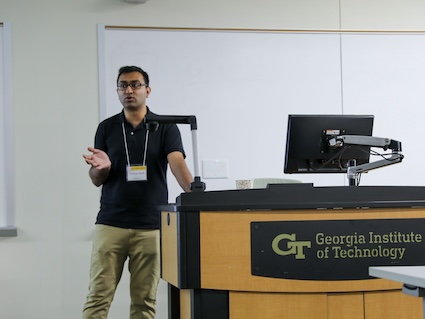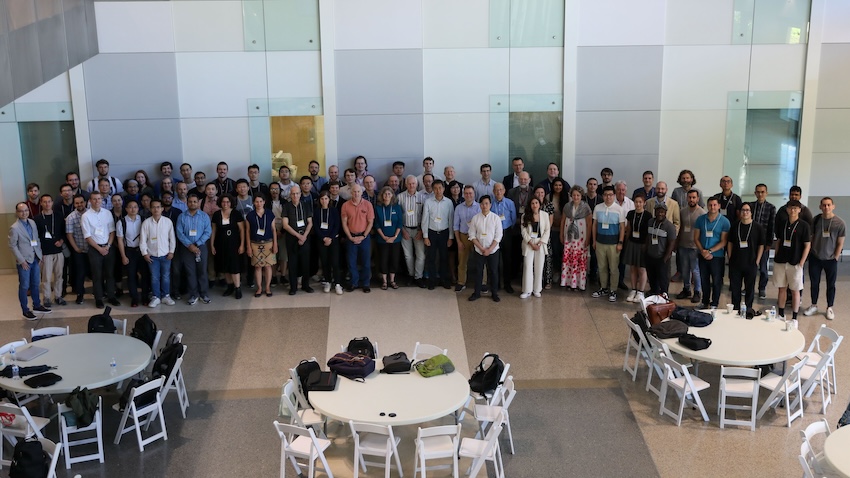
International Conference Meets to Make Math Easier for Computer Models
From weather prediction to drug discovery, math powers the models used in computer simulations. To help these vital tools with their calculations, global experts recently met at Georgia Tech to share ways to make math easier for computers.
Tech hosted the 2024 International Conference on Preconditioning Techniques for Scientific and Industrial Applications (Precond 24), June 10-12.
Preconditioning accelerates matrix computations, a kind of math used in most large-scale models. These computer models become faster, more efficient, and more accessible with help from preconditioned equations.
“Preconditioning transforms complex numerical problems into more easily solved ones,” said Edmond Chow, a professor at Georgia Tech and co-chair of Precond 24’s local organization and program committees.
“The new problem wields a better condition number, giving rise to the name preconditioning.”

Researchers from 13 countries presented their work through 20 mini-symposia and seven invited talks at Precond 24. Their work showcased the practicality of preconditioners.
Vandana Dwarka, an assistant professor at Delft University of Technology, shared newly developed preconditioners for electromagnetic simulations. This technology can be used in further applications ranging from imaging to designing nuclear fusion devices.
Xiaozhe Hu presented a physics-based preconditioner that simulates biophysical processes in the brain, such as blood flow and metabolic waste clearance. Hu brought this research from Tufts University, where he is an associate professor.
Tucker Hartland, a postdoctoral researcher at Lawrence Livermore National Laboratory, discussed preconditioning in contact mechanics. This work improves the modeling of interactions between physical objects that touch each other. Many fields stand to benefit from Hartland’s study, including mechanical engineering, civil engineering, and materials science.
A unique aspect of this year’s conference was an emphasis on machine learning (ML). Between a panel discussion, tutorial, and several talks, experts detailed how to employ ML for preconditioning and how preconditioning can train ML models.
Precond 24 invited seven speakers from institutions around the world to share their research with conference attendees. The presenters were:
- Monica Dessole, CERN, Switzerland
- Selime Gurol, CERFACS, France
- Alexander Heinlein, Delft University of Technology, Netherlands
- Rui Peng Li, Lawrence Livermore National Laboratory, USA
- Will Pazner, Portland State University, USA
- Tyrone Rees, Science and Technology Facilities Council, UK
- Jacob B. Schroder, University of New Mexico, USA
Along with hosting Precond 24, several Georgia Tech researchers participated in the conference through presentations.

Ph.D. students Hua Huang and Shikhar Shah each presented a paper on the conference’s first day. Alumnus Srinivas Eswar (Ph.D. CS 2022) returned to Atlanta to share research from his current role at Argonne National Laboratory. Chow chaired the ML panel and a symposium on preconditioners for matrices.
“It was an engaging and rewarding experience meeting so many people from this very tight-knit community,” said Shah, who studies computational science and engineering (CSE). “Getting to see talks close to my research provided me with a lot of inspiration and direction for future work.”
Precond 2024 was the thirteenth meeting of the conference, which occurs every two years.
The conference returned to Atlanta this year for the first time since 2005. Atlanta joins Minneapolis as one of only two cities in the world to host Precond more than once. Precond 24 marked the sixth time the conference met in the U.S.
Georgia Tech and Emory University’s Department of Mathematics organized and sponsored Precond 24. The U.S. Department of Energy Office of Science co-sponsored the conference with Tech and Emory.
Georgia Tech entities swarmed together in support of Precond 24. The Office of the Associate Vice President for Research Operations and Infrastructure, College of Computing, and School of CSE co-sponsored the conference.
“The enthusiasm at the conference has been very gratifying. So many people organized sessions at the conference and contributed to the very strong attendance,” Chow said.
“This is a testament to the continued importance of preconditioning and related numerical methods in a rapidly changing technological world.”

As computing revolutionizes research in science and engineering disciplines and drives industry innovation, Georgia Tech leads the way, ranking as a top-tier destination for undergraduate computer science (CS) education. Read more about the college's commitment:… https://t.co/9e5udNwuuD pic.twitter.com/MZ6KU9gpF3
— Georgia Tech Computing (@gtcomputing) September 24, 2024


